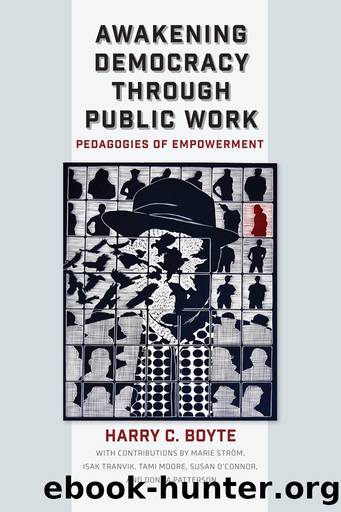Awakening Democracy Through Public Work: Pedagogies of Empowerment by Harry C. Boyte

Author:Harry C. Boyte [Boyte, Harry C.]
Language: eng
Format: epub
Tags: Politics
ISBN: 9780826522177
Google: OKwZtQEACAAJ
Goodreads: 39651096
Publisher: Vanderbilt University Press
Published: 2018-01-15T06:32:21+00:00
The seemingly sharp distinctions are framed by the argument that there are a few âuniversalsâ to political life, applying across widely varying cultural and community contexts, but nothing is ever âeither-or.â As Gerald Taylor puts it, âWeâre the same people after all, whether we are in a public or a private setting.â These concepts are best understood as fluid and influenced by context. Different settings such as a church service or a school or a geographical community, take on varying public and private qualities. A church, explained Arnie Graf, a long time IAF organizer, is more personal than a political convention.
Differentiating between public and private relationships has proven to be very useful for students learning public work approaches. It forms the basis of the collective evaluation that Public Achievement teams conduct at the end of every meeting and action. This fosters a culture and habit of mutual accountability and joint responsibility for the work of the group. It follows the pattern of experiential learning, drawing lessons from the ups and downs of a teamâs life and the successes and challenges of a teamâs work. Collective evaluation can be a difficult practice to implement initiallyâbeing held accountable can be uncomfortableâbut when conducted in a supportive way it is transformative.
The concept emphasizes a public world of diverse interests, views, and backgrounds where the main point is to create public relationships for public work, not to find personal love or intimacy; this framework is often missing in schools with a focus on therapeutic approaches. In Dennis Donovanâs undergraduate class at the University of Minnesota, which distills lessons of Public Achievement, students say that learning the difference between private relationships and public relationships is extremely helpful in negotiating many settings. âBefore this class I was constantly trying to impress and get praise from everyone in my life whether it was a teacher, boss or coach,â said Max Thommes, a UMN football player in Dennisâs class. âThat was a very stressful and demanding way to live my life. Does my teacher like me? Why does the head guard always pick on me during training?â Learning to distinguish public from private relationships was a revelation. âThis class really taught me about where to get my loving from, my friends and family. With public relationships politics plays a huge role in a personâs decision making. This does not mean you shouldnât do your homework or not be on your coachâs good side. Instead you just need to understand that those relationships do not make or break you.â47 As special education students learned this distinction in Public Achievement, they developed what Alyssa Blood calls a âpublic persona,â a citizen identity, as Chapter 7 describes.
Download
This site does not store any files on its server. We only index and link to content provided by other sites. Please contact the content providers to delete copyright contents if any and email us, we'll remove relevant links or contents immediately.
Zero to IPO: Over $1 Trillion of Actionable Advice from the World's Most Successful Entrepreneurs by Frederic Kerrest(4569)
Machine Learning at Scale with H2O by Gregory Keys | David Whiting(4313)
Never by Ken Follett(3957)
Harry Potter and the Goblet Of Fire by J.K. Rowling(3857)
Ogilvy on Advertising by David Ogilvy(3622)
Shadow of Night by Deborah Harkness(3368)
The Man Who Died Twice by Richard Osman(3079)
Book of Life by Deborah Harkness(2939)
The Tipping Point by Malcolm Gladwell(2922)
Will by Will Smith(2919)
Purple Hibiscus by Chimamanda Ngozi Adichie(2853)
0041152001443424520 .pdf by Unknown(2845)
My Brilliant Friend by Elena Ferrante(2831)
How Proust Can Change Your Life by Alain De Botton(2814)
How to Pay Zero Taxes, 2018 by Jeff A. Schnepper(2655)
Hooked: A Dark, Contemporary Romance (Never After Series) by Emily McIntire(2554)
Rationality by Steven Pinker(2364)
Can't Hurt Me: Master Your Mind and Defy the Odds - Clean Edition by David Goggins(2341)
Borders by unknow(2315)
